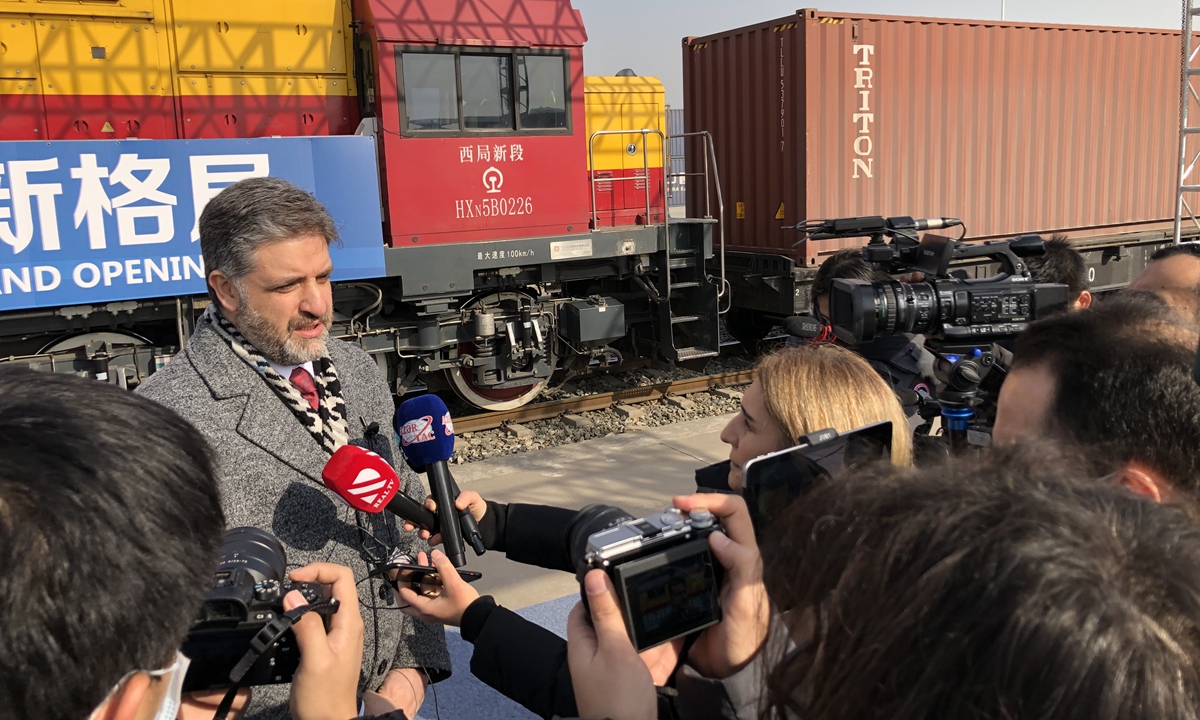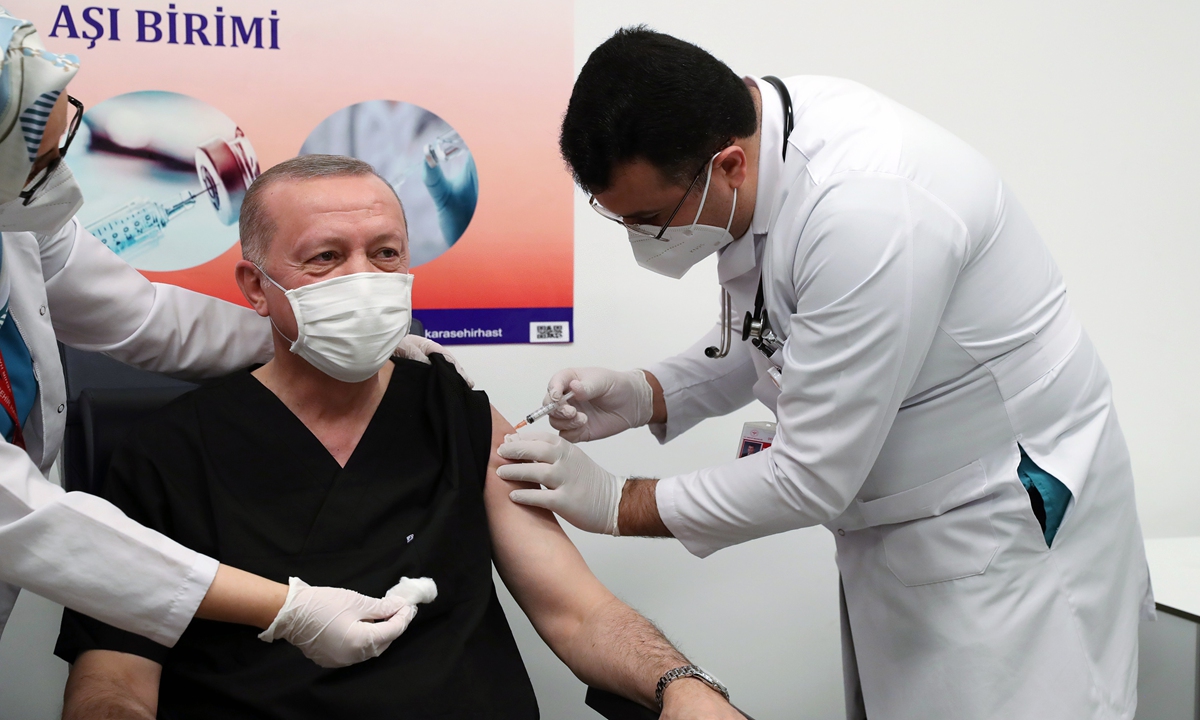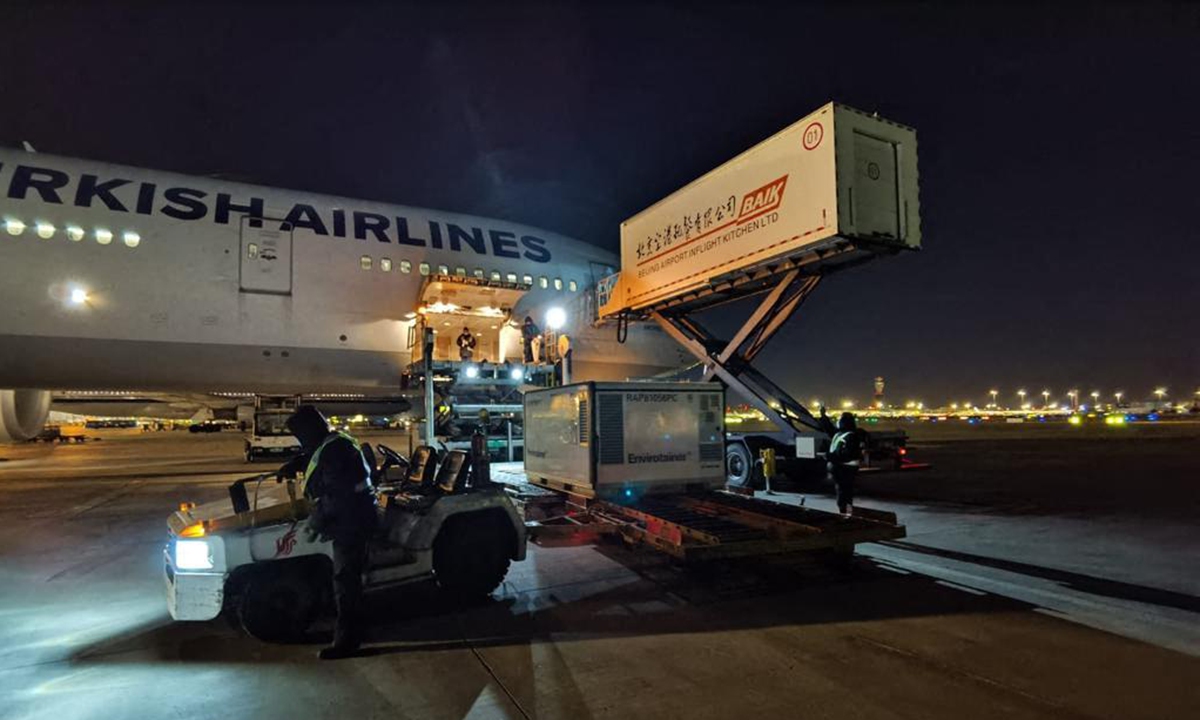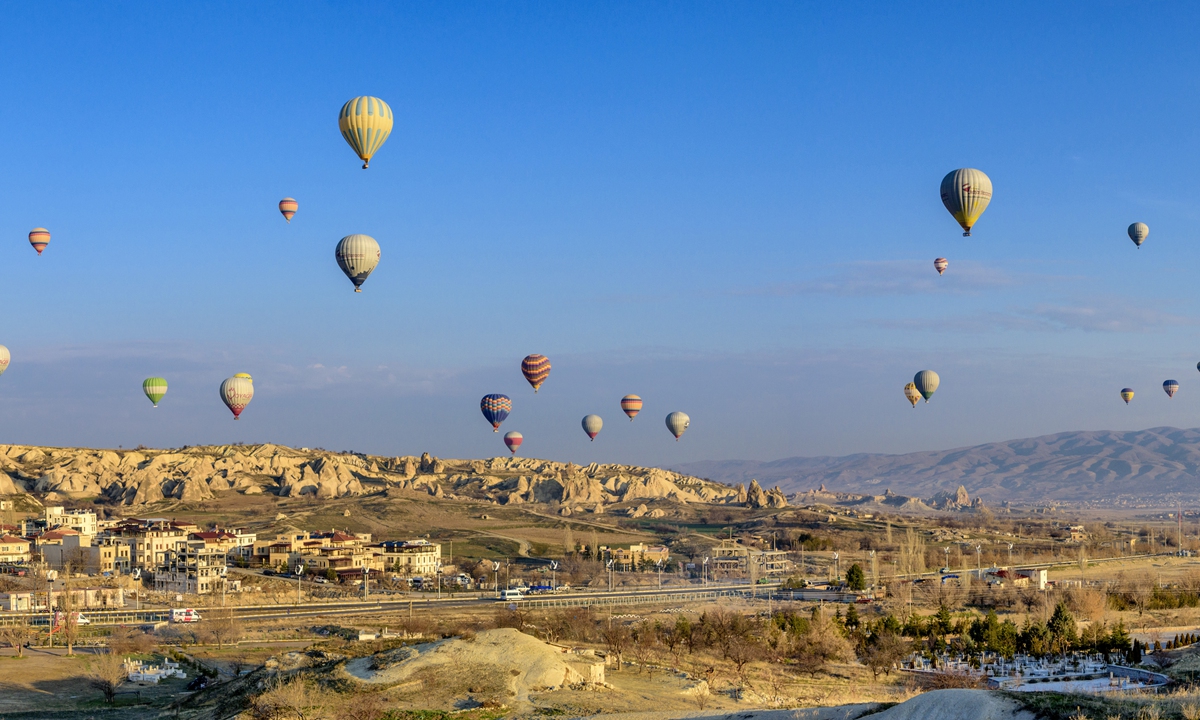Ankara embraces further vaccine, judicial and economic cooperation with Beijing: Turkish Ambassador
Editor's Note:
On Monday, Turkey received another 6.5 million Chinese COVID-19 vaccines which will be used in the country's nationwide vaccination plan. The two countries have maintained close cooperation in the battle against the virus from the outset of the outbreak to the current vaccination stage. In addition to cooperating in fighting COVID-19, the two countries also push forward cooperation in other fields, like judicially and economically. Some Western media outlets tried to taint this close relationship and made groundless accusations about the extradition bill between the two countries. How will bilateral relations develop under such circumstances? When will Turkey ratify the extradition bill? Global Times reporter Xie Wenting (GT) talked with Turkish Ambassador to China Abdulkadir Emin Önen (Önen).

GT: Turkey has approved emergency use of Sinovac's COVID-19 vaccine. What's the latest about this issue?
Önen: Turkey has started its mass vaccination program with Sinovac's CoronaVac. Our President and Minister of Health have also received the first doses of this vaccine. The agreement with Sinovac entails the procurement of 50 million doses. First of all, 1.1 million health workers across the country will be vaccinated. We are expecting to receive more doses in the coming weeks. The plan is to secure access to a variety of vaccines so as to immunize a large part of our population, which is more than 80 million, against COVID-19. Therefore, our vaccination program will also include other vaccines like the Pfizer-BioNTech vaccine. Moreover, we plan to complete phase three trials of our nationally manufactured vaccine by April.
GT: Some people and media outlets now accuse China of pursuing "vaccine diplomacy." What's your take on this?
Önen: We try to maintain close dialogue with China regarding vaccine production and supply. Vaccine cooperation should be on everyone's agenda. Diplomacy, in its own way, should contribute to the global effort to combat COVID-19. Our President Recep Tayyip Erdoğan has emphasized on more than one occasion that work on COVID-19 vaccines should be pursued regardless of political and commercial interests and vaccines should be considered the common property of humankind. Chinese President Xi Jinping made a similar call to make China's vaccines a global public good.
We hope to deepen our cooperation with China with respect to the goal of ensuring fair and equitable access to COVID-19 vaccines across the world, especially for those in need in developing countries. The pandemic provides a great lesson for all to appreciate the interdependence among nations. As the outbreak does not take into account boundaries, classes and identities, we need to have a global outlook in overcoming this unprecedented challenge. No single country can go it alone. Even within our borders, we should act with a sense of international solidarity. This is why Turkey's epidemic control and prevention efforts were aimed not only toward its own citizens, but also covered the approximately four million refugees in our country.
Overall, as a country trying hard to bring to the fore the concerns of emerging countries, Turkey appreciates and supports China's commitment to prioritize developing countries with respect to accessing COVID-19 vaccines. Upholding multilateralism at this critical stage in our world and humankind is more important than ever.


GT: Could you provide more information regarding cooperation between Turkey and China in combating COVID-19?
Önen: We provided each other with much-needed protective equipment and medical supplies, depending on each country's requirements at the beginning of the outbreak. Turkey was among the first countries to send medical aid to China in early February 2020. Vaccine cooperation has become the most recent example of our enhanced dialogue in the field of healthcare. Of course, many important aspects of our bilateral cooperation, especially in the fields of tourism, civil aviation and trade, were unfortunately stalled during 2020 due to the COVID-19 crisis. This has been the case for the whole world. However, we still managed to strengthen our solidarity and friendship at a time of great distress. With mass vaccinations in both Turkey and China currently underway, we hope to achieve mass immunization as soon as possible and continue deepening our strategic cooperation throughout 2021.
GT: Last month, China ratified an extradition treaty with Turkey. When do you think Turkey will ratify this agreement?
Önen: The Treaty of Extradition between Turkey and China was signed at the ministerial level in 2017 to promote bilateral judicial cooperation. The treaty was then submitted to the Grand National Assembly of Turkey and the standard ratification process of international treaties has begun. It should be underlined that, just as our Foreign Minister H.E. Mr. Mevlüt Çavuşoğlu recently stated, "It is the decision of our Parliament to ratify it or not."
Turkey has so far concluded extradition treaties at the bilateral level with 32 countries. This treaty aims to increase cooperation in criminal justice within the rule of law. We attach importance to comprehensively improving bilateral judicial cooperation between Turkey and China. We believe that result-oriented cooperation in judicial matters will be beneficial for both countries.
GT: Last month the first cargo train from Turkey to China arrived in Xi'an. From your perspective, what is the significance of this development?
Önen: We welcome this important development. This is the first export cargo train from Turkey to China since the China-Europe freight train transited Turkey for the first time in November 2019. The train followed the Trans-Caspian East-West Middle Corridor via the Kars-Tbilisi-Baku railway and reached Xi'an in just 12 days. Thanks to effective cooperation between Turkey, China and other transit countries, once a distant dream has finally become reality.
I visited Xi'an in late December to attend the ceremony for the arrival of the first east-bound train and met with provincial officials and business organizations. The number of these freight trains is expected to increase in 2021. Further use of this railway connection will also be beneficial for our bilateral economic relations. Turkish and Chinese products will be more easily delivered with these freight trains. Various tools of the digital economy, particularly e-commerce platforms can play a key role in this setting. We are looking forward to seeing more Turkish export products in Chinese e-commerce platforms.
In addition, the railway connection between China and Europe has become even more vital during the pandemic as freight trains play a crucial role in stabilizing the international logistics supply chain. Turkey was an early supporter of the Belt and Road Initiative. Its strategic location and highly developed transportation networks at the intersection of the European, Middle Eastern and African markets play a key role in strengthening business resilience by providing safe, stable and fast supply chains.
GT: In 2021, Turkey and China will celebrate the 50th anniversary of the establishment of diplomatic relations. From this perspective, how will Turkey-China relations develop in 2021?
Önen: While interactions between the Turks and the Chinese date back a few millennia, the diplomatic relations between our two countries were established in 1971. In light of the joint vision of strategic cooperative relations shared by our presidents, our bilateral relations have been developing steadily.
We have witnessed positive developments in our bilateral cultural relations in recent years and a significant increase in people-to-people contacts. The number of Chinese tourists visiting Turkey has steadily increased, reaching 565.000 in 2019. We have an aim to increase this number to 1 million after the pandemic is over.
As you have pointed out, 2021 will mark the 50th anniversary of the establishment of our bilateral diplomatic relations. Turkey is eager to use this important milestone to further strengthen the bonds between the two countries. While many aspects of bilateral cooperation between Turkey and China have stalled during 2020 due to the global coronavirus crisis, the Turkish side is determined to carry out various activities to celebrate this historical anniversary in a manner that is truly reflective of the common aspirations of our peoples. In 2021, with the continuing support and assistance of our Chinese friends and colleagues, we are aiming to inaugurate our Consulate-General in Chengdu and the Yunus Emre Turkish Cultural Center in Beijing, which will further cement ties between our countries and peoples.

GT: Turkey has recently announced the "Asia Anew Initiative" in its foreign policy. Is this initiative a "shift-of-axis" in Turkish foreign policy?
Önen: Turkey announced its Asia Anew initiative in 2019 with the view to deepen historic ties with Asia in a holistic way by bringing together the government, private sector, civil society and academia for a fresh impetus to our already strong relations with Asia.
We highly value deep-rooted multilateral cooperation and partnership mechanisms across Asia. Currently, Turkey is carrying out the term presidency of the Asian Parliamentary Assembly and the Asia Cooperation Dialogue.
Turkey's Asia Anew initiative is a recognition of Asia's significance and Turkey's eagerness to focus on the continent. While Turkey is a NATO ally, an EU accession candidate, a founding member of the Council of Europe and the OSCE, her strategic relations with the European and Transatlantic political/security structures do not hinder her from further developing her ties with Asia. Therefore, the rhetoric about a "shift-of-axis" in our foreign policy does not reflect the true nature of our approach. Foreign policy is not built on clichés and dogmas but on global, regional realities and national interests. It is not a zero-sum game, but a win-win game. Our policies and partnerships are complementary in nature.
The importance of China in our Asia Anew initiative is self-evident. China has come to the fore of the global and regional stage with its rapid development, and according to projections, is expected to become the world's biggest economy by the next decade. Engaging with China within our Asia Anew initiative framework will be mutually beneficial and contribute to peace, stability and prosperity across the continent.
On Monday, Turkey received another 6.5 million Chinese COVID-19 vaccines which will be used in the country's nationwide vaccination plan. The two countries have maintained close cooperation in the battle against the virus from the outset of the outbreak to the current vaccination stage. In addition to cooperating in fighting COVID-19, the two countries also push forward cooperation in other fields, like judicially and economically. Some Western media outlets tried to taint this close relationship and made groundless accusations about the extradition bill between the two countries. How will bilateral relations develop under such circumstances? When will Turkey ratify the extradition bill? Global Times reporter Xie Wenting (GT) talked with Turkish Ambassador to China Abdulkadir Emin Önen (Önen).

Turkish Ambassador to China Abdulkadir Emin Önen
GT: Turkey has approved emergency use of Sinovac's COVID-19 vaccine. What's the latest about this issue?
Önen: Turkey has started its mass vaccination program with Sinovac's CoronaVac. Our President and Minister of Health have also received the first doses of this vaccine. The agreement with Sinovac entails the procurement of 50 million doses. First of all, 1.1 million health workers across the country will be vaccinated. We are expecting to receive more doses in the coming weeks. The plan is to secure access to a variety of vaccines so as to immunize a large part of our population, which is more than 80 million, against COVID-19. Therefore, our vaccination program will also include other vaccines like the Pfizer-BioNTech vaccine. Moreover, we plan to complete phase three trials of our nationally manufactured vaccine by April.
GT: Some people and media outlets now accuse China of pursuing "vaccine diplomacy." What's your take on this?
Önen: We try to maintain close dialogue with China regarding vaccine production and supply. Vaccine cooperation should be on everyone's agenda. Diplomacy, in its own way, should contribute to the global effort to combat COVID-19. Our President Recep Tayyip Erdoğan has emphasized on more than one occasion that work on COVID-19 vaccines should be pursued regardless of political and commercial interests and vaccines should be considered the common property of humankind. Chinese President Xi Jinping made a similar call to make China's vaccines a global public good.
We hope to deepen our cooperation with China with respect to the goal of ensuring fair and equitable access to COVID-19 vaccines across the world, especially for those in need in developing countries. The pandemic provides a great lesson for all to appreciate the interdependence among nations. As the outbreak does not take into account boundaries, classes and identities, we need to have a global outlook in overcoming this unprecedented challenge. No single country can go it alone. Even within our borders, we should act with a sense of international solidarity. This is why Turkey's epidemic control and prevention efforts were aimed not only toward its own citizens, but also covered the approximately four million refugees in our country.
Overall, as a country trying hard to bring to the fore the concerns of emerging countries, Turkey appreciates and supports China's commitment to prioritize developing countries with respect to accessing COVID-19 vaccines. Upholding multilateralism at this critical stage in our world and humankind is more important than ever.

Turkish President Recep Tayyip Erdogan receives his COVID-19 vaccine developed by China's Sinovac on January 14. Photo: Xinhua

The first batch of 3 million COVID-19 vaccines to Turkey from China is loaded onto a flight in Beijing on December 29, 2020.g Photo: IC
GT: Could you provide more information regarding cooperation between Turkey and China in combating COVID-19?
Önen: We provided each other with much-needed protective equipment and medical supplies, depending on each country's requirements at the beginning of the outbreak. Turkey was among the first countries to send medical aid to China in early February 2020. Vaccine cooperation has become the most recent example of our enhanced dialogue in the field of healthcare. Of course, many important aspects of our bilateral cooperation, especially in the fields of tourism, civil aviation and trade, were unfortunately stalled during 2020 due to the COVID-19 crisis. This has been the case for the whole world. However, we still managed to strengthen our solidarity and friendship at a time of great distress. With mass vaccinations in both Turkey and China currently underway, we hope to achieve mass immunization as soon as possible and continue deepening our strategic cooperation throughout 2021.
GT: Last month, China ratified an extradition treaty with Turkey. When do you think Turkey will ratify this agreement?
Önen: The Treaty of Extradition between Turkey and China was signed at the ministerial level in 2017 to promote bilateral judicial cooperation. The treaty was then submitted to the Grand National Assembly of Turkey and the standard ratification process of international treaties has begun. It should be underlined that, just as our Foreign Minister H.E. Mr. Mevlüt Çavuşoğlu recently stated, "It is the decision of our Parliament to ratify it or not."
Turkey has so far concluded extradition treaties at the bilateral level with 32 countries. This treaty aims to increase cooperation in criminal justice within the rule of law. We attach importance to comprehensively improving bilateral judicial cooperation between Turkey and China. We believe that result-oriented cooperation in judicial matters will be beneficial for both countries.
GT: Last month the first cargo train from Turkey to China arrived in Xi'an. From your perspective, what is the significance of this development?
Önen: We welcome this important development. This is the first export cargo train from Turkey to China since the China-Europe freight train transited Turkey for the first time in November 2019. The train followed the Trans-Caspian East-West Middle Corridor via the Kars-Tbilisi-Baku railway and reached Xi'an in just 12 days. Thanks to effective cooperation between Turkey, China and other transit countries, once a distant dream has finally become reality.
I visited Xi'an in late December to attend the ceremony for the arrival of the first east-bound train and met with provincial officials and business organizations. The number of these freight trains is expected to increase in 2021. Further use of this railway connection will also be beneficial for our bilateral economic relations. Turkish and Chinese products will be more easily delivered with these freight trains. Various tools of the digital economy, particularly e-commerce platforms can play a key role in this setting. We are looking forward to seeing more Turkish export products in Chinese e-commerce platforms.
In addition, the railway connection between China and Europe has become even more vital during the pandemic as freight trains play a crucial role in stabilizing the international logistics supply chain. Turkey was an early supporter of the Belt and Road Initiative. Its strategic location and highly developed transportation networks at the intersection of the European, Middle Eastern and African markets play a key role in strengthening business resilience by providing safe, stable and fast supply chains.
GT: In 2021, Turkey and China will celebrate the 50th anniversary of the establishment of diplomatic relations. From this perspective, how will Turkey-China relations develop in 2021?
Önen: While interactions between the Turks and the Chinese date back a few millennia, the diplomatic relations between our two countries were established in 1971. In light of the joint vision of strategic cooperative relations shared by our presidents, our bilateral relations have been developing steadily.
We have witnessed positive developments in our bilateral cultural relations in recent years and a significant increase in people-to-people contacts. The number of Chinese tourists visiting Turkey has steadily increased, reaching 565.000 in 2019. We have an aim to increase this number to 1 million after the pandemic is over.
As you have pointed out, 2021 will mark the 50th anniversary of the establishment of our bilateral diplomatic relations. Turkey is eager to use this important milestone to further strengthen the bonds between the two countries. While many aspects of bilateral cooperation between Turkey and China have stalled during 2020 due to the global coronavirus crisis, the Turkish side is determined to carry out various activities to celebrate this historical anniversary in a manner that is truly reflective of the common aspirations of our peoples. In 2021, with the continuing support and assistance of our Chinese friends and colleagues, we are aiming to inaugurate our Consulate-General in Chengdu and the Yunus Emre Turkish Cultural Center in Beijing, which will further cement ties between our countries and peoples.

A view of Cappadocia, Turkey, which is a popular scenic spot for Chinese toursits Photo: IC
GT: Turkey has recently announced the "Asia Anew Initiative" in its foreign policy. Is this initiative a "shift-of-axis" in Turkish foreign policy?
Önen: Turkey announced its Asia Anew initiative in 2019 with the view to deepen historic ties with Asia in a holistic way by bringing together the government, private sector, civil society and academia for a fresh impetus to our already strong relations with Asia.
We highly value deep-rooted multilateral cooperation and partnership mechanisms across Asia. Currently, Turkey is carrying out the term presidency of the Asian Parliamentary Assembly and the Asia Cooperation Dialogue.
Turkey's Asia Anew initiative is a recognition of Asia's significance and Turkey's eagerness to focus on the continent. While Turkey is a NATO ally, an EU accession candidate, a founding member of the Council of Europe and the OSCE, her strategic relations with the European and Transatlantic political/security structures do not hinder her from further developing her ties with Asia. Therefore, the rhetoric about a "shift-of-axis" in our foreign policy does not reflect the true nature of our approach. Foreign policy is not built on clichés and dogmas but on global, regional realities and national interests. It is not a zero-sum game, but a win-win game. Our policies and partnerships are complementary in nature.
The importance of China in our Asia Anew initiative is self-evident. China has come to the fore of the global and regional stage with its rapid development, and according to projections, is expected to become the world's biggest economy by the next decade. Engaging with China within our Asia Anew initiative framework will be mutually beneficial and contribute to peace, stability and prosperity across the continent.
